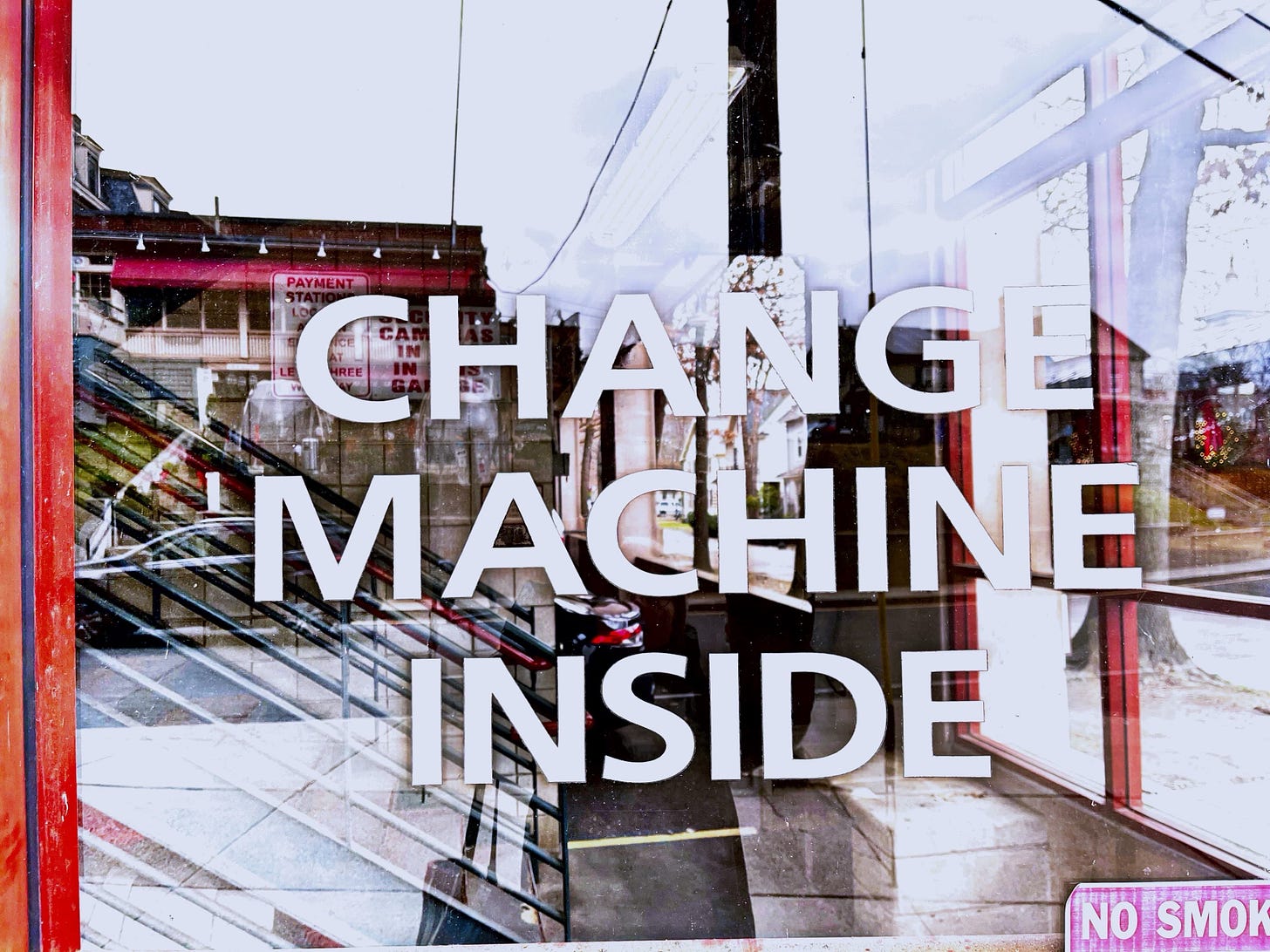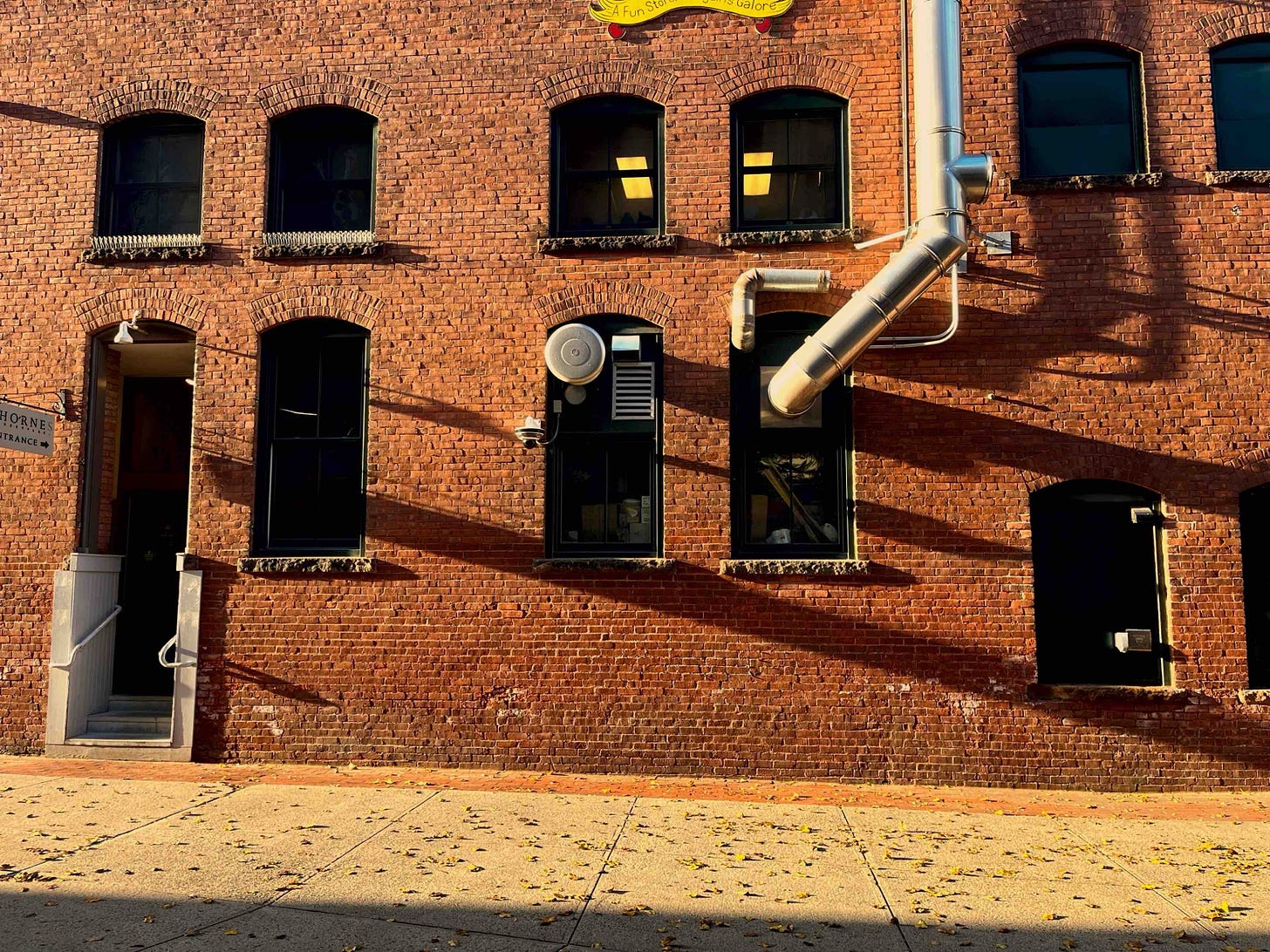Change Machine Inside
is it optimizing or is it the destruction of (my) human spirit? a philosophical debate in three parts
Things I track: books read per year; books I want to read; hours written per month, word count per month, project thinking time per month; rest days; steps and zone minutes; how many loads of laundry I do a week (I promise you don’t want to know); how often we eat meat with dinner; my income, my expenses, my tax deductions, my tax payments; literary submissions, grants applied for, books sold; how often I exercise; my semi-daily tarot cards pulls. I don’t think of myself as an “optimizer” or someone who is overly concerned with productivity. There are many entirely impractical practices that I enjoy and have historically chosen over “work” for much of my life—writing being the big one: almost every decision I’ve made since my Saturn return has been landed on because it would support my ability to write. Writing, in any form, has been my North Star, my raison d’etre, my “why,” my purpose. Despite this, my writing career—as it were—has not been prolific. It’s been good, maybe even great, definitely better than I might have expected, and yet… lately I cannot shake the feeling that I’ve turned the writing part, the truest part, of this experience into something sterile.
Before I moved out to the suburbs, I lived in downtown Northampton for a long time. Thirteen years, give or take. It wasn’t practical; often my rent cost about two thirds of my (usually multiple-part-time-jobs) income. But I derived enormous satisfaction, energy, and inspiration from the atmosphere. Several of the stories in What Shines from It are set in places I once casually inhabited. I used to pass this window most days on my walk into work. For a while, I used the machine to get quarters for the dingy washer and dryer in my dingy apartment’s dingy laundry room. That laundry room gave me the heebie-jeebies but it was a step up from the haul to the laundromat. I passed the window yesterday on a quick trip to the natural food store and, I don’t know, it struck me as funny. As different than usual. I tried to think about why. Maybe it’s because I’m now in the process of teaching my children some of the interesting and weird aspects of language. Or maybe I’m on some mysterious cycle of renewal and new vision. “Change” here is very obviously indicative of coin currency. Before the meters got replaced by those blasted boxes requiring your license plate number, you needed quarters to park downtown. But I couldn’t help but think of “change” as in the promise of becoming something different. Perhaps I could step inside this change machine and emerge altered. Perhaps I was being recast as I stood there considering. How often is the same word both a noun and a verb? How often do the noun and verb that look exactly alike mean entirely different things? How often is our understanding of language influenced by experience, subtext, the world surrounding us? How much effort does it take to understand anything—especially the most codified forms—in a new way?
I’m interested in organization as a practice (blame the Virgo Rising), but only to a point (I am a Sagittarius after all). I’m interested in systems and in strategies; I see patterns everywhere. Back in 2020, when I was spinning my wheels about my writing, I established an Excel worksheet to track my writing time. It began as three columns: Date, Hours, On What? It was loose. It was helpful. I think I was able to write XO as quickly as I did partly because of it. I can tell you that April is not good month for my writing, so I’ve stopped expecting it to be. The spreadsheet has changed over the years, and it now has five columns and blank spaces for my rest days. I like this system, and yet, lately, I’ve come to sneak glances at it out of the corner of my eye, wondering if it isn’t destroying something I used to love. Maybe you know the thing I’m talking about: the ability to lose oneself in the experience of creation. How can one get lost if one has a tracking device to monitor one’s progress all the time? This strikes me as ridiculous, and achingly accurate. How often are two opposite ideas both true? Is it ever possible to strike a balance? Or is balance—reduced to a static concept, perfect yet immovable—futile? And perhaps this is it, the place I often land in debates with myself: once the system stops growing—stops changing—it’s ready to die. Balance isn’t static at all; it’s an endless series of micromovements, in constant adjustment for the benefit of a whole.
Read(ing) Lately
The Future by Naomi Alderman — A Christmas gift from my husband, who heard an interview with Alderman on NPR and figured I’d be into this, which—of course!—I was. I couldn’t put it down: the plot, the characters, the ideas. So much to think about and take forward from this gorgeous, complex book.
The Changeling by Victor LaValle — Not sure why it’s taken me so long to get to this book, given that LaValle is one of my favorite contemporary writers (maybe I knew I’d love it so much that I wanted to put off the pleasure of reading it for as long as I could?), but holy WOW, I devoured this in great gulps. A seamless melding of myth, the terror of being a new parent, New York City history, the battles we fight for those we love, and much more.
The Aenied by Virgil; translated by Robert Fagles — Part of my mission to read more classics this year, I’m about halfway through, marveling at my misconceptions about what this book is, and enjoying the poetry (but no much all the animal sacrifices). More about this next week!




